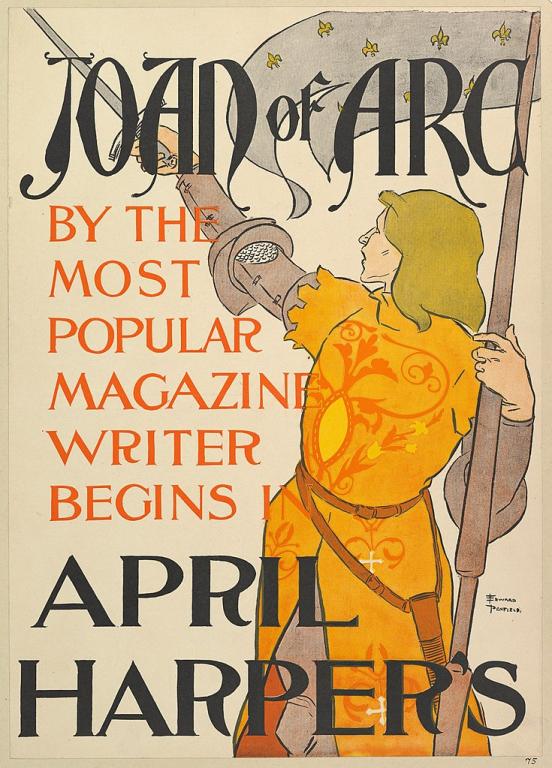
***
This short but inspiring piece was published today on the website of the Interpreter Foundation:
***
Back in March 2006, my wife and I attended the production of a play at Brigham Young University that impressed me very much. Written by Melissa Leilani Larson and directed by David Morgan, it was Angels Unaware: A Story of Joan of Arc. I would love to see it (and to see it produced) again. For the first time — I had honestly never given St. Joan of Arc much thought prior to that time — it raised the question in my mind of whether Joan might actually have been interacting with real angels.
I’m quite sympathetic to the thought. My only reservation is that I can’t quite see why God would care about whether or not Charles VII was crowned at the Cathedral of Reims. Charles seems such an unworthy object of divine concern. What difference did it make? On the other hand, Joan’s accomplishments are so astoundingly remarkable — an illiterate teenage peasant girl becomes the commander of the armies of France and essentially puts an end to the Hundred Years’ War? — that’s it’s difficult for me to imagine how the supernatural could not have been involved in her story.
Since seeing that play, I’ve visited the twentieth-century church dedicated to her in Rouen, which stands in the center of the Place du Vieux-Marché, the city’s ancient market square, where she was burned at the stake for supposed heresy in 1431.
I spoke about Joan in passing during my remarks at the 2019 FairMormon conference, ““Idle Tales”? The Witness of Women”: Here, with something of the roughness that one might expect from a transcript of an oral presentation, is what I said about her;
While I was thinking about women and their witnesses, I thought about this one, Saint Joan of Arc. In the early 15th century, late in the Hundred Years’ War, Jeanne d’Arc (Joan of Arc) claimed to have received visions: the Archangel Michael, St Margaret, and St Catherine of Alexandria telling her to support the as yet uncrowned Charles the 7th of France, and thereby free France from English domination. Now I’d always thought that this was a nice story until a saw a play at BYU, written by Leilani Larson, called Angels Unaware: A Story of Joan of Arc in 2006, in which she took those angels as serious from a Latter-day Saint perspective, post death, post mortem people — the real St Catherine of Alexandria and so on, who’d been called upon to help this French girl and make things work for her. And I thought, “You know, could this story be true? I mean God does things that we don’t always know about. Could this be a true story of angelic intervention on behalf of this French girl?”
Let me tell you who was impressed by her. There’s a young boy by the name of Coley Taylor who told this story late in his life. He approached the aged Mark Twain one day, after noticing the author, very famous, standing alone on a stone bridge in Redding, Connecticut. Twain was a familiar figure around the town and young Coley had always wanted to talk to him to express his admiration for him. “I was glad,” he says, “that he was alone.” He wrote an article about this. “I had wanted to tell him how much I had enjoyed Tom Sawyer and Huckleberry Finn.”
But Twain’s response to the young boy was shocking. “I had never seen him so cross. I can see him yet, shaking that long forefinger at me,” Taylor recalled. “You shouldn’t read those books about bad boys!” Twain scolded him. “Now listen to what an old man tells you. My best book is my recollection of Joan of Arc.” This is his last novel. “You are too young to understand and enjoy it now, but read it when you are older. Remember then what I tell you now. Joan of Arc is my very best book.” Now most literary critics have not agreed with him but he made that same comment at other settings. “I like Joan of Arc best of all of my books,” he said shortly before his death, “and it is the best; I know it perfectly well. And besides, it furnished me seven times the pleasure afforded me by any of the others; twelve years of preparation, and two years of writing. The others needed no preparation and got none.”
Now this is very odd. She was a visionary and he was a notorious religious skeptic, very likely an atheist. His background was Protestant, anti-Catholic, and he hated the French. Couldn’t stand them.
She was French, died a Catholic martyr, and in 1920 became a Catholic Saint, but he was really, really impressed with her story, and if anything tempted him to abandon his religious cynicism, I think it was Joan of Arc.
A couple of weeks ago, my wife and I watched the 1928 French silent film La Passion de Jeanne d’Arc (The Passion of Joan of Arc), by the Danish director Carl Theodore Dreyer. It’s simply stunning.
And, now, I’ve just finished a reading of Mark Twain’s Personal Recollections of Joan of Arc, by the Sieur Louis de Conte, which he published in 1896. I enjoyed it very, very much.
Why the renewed attention to St. Joan? My wife and I are shortly to lead the discussion in a monthly meeting of one of the reading groups to which we belong, and we chose Twain’s novel as the book selection for the evening.
I’ll probably be posting about Joan once or twice more over the next few days.
In the final paragraph of a 1904 essay that Twain added as an appendix to his novel, he offered this perspective, speaking in his own voice:
Taking into account . . . all the circumstances — her origin, youth, sex, illiteracy, early environment, and the obstructing conditions under which she exploited her high gifts and made her conquests in the field and before the courts that tried her for her life — she is easily and by far the most extraordinary person the human race has ever produced.












